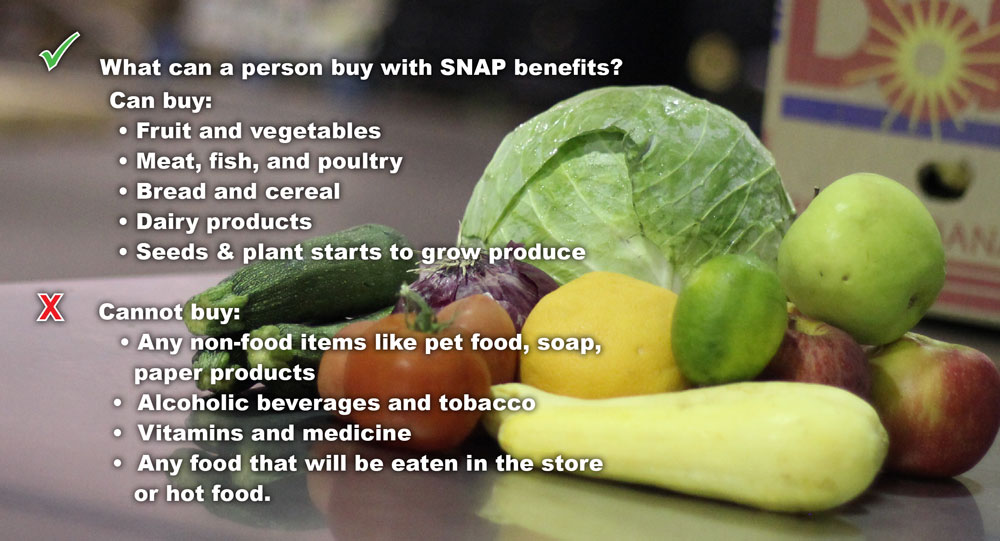

SNAP: Formerly known as Food Stamps
The Supplemental Nutrition Assistance Program (SNAP, formerly known as food stamps) is the federal program that provides supplemental grocery support to low-income households and is funded through the Farm Bill. In North Carolina, this program operates under Food and Nutrition Services (FNS) and provides an Electronic Benefit Transfer (EBT) card to households who qualify to receive support.
Food Bank of the Albemarle has two SNAP outreach specialists who are trained to help you navigate the process of applying for and recertifying for SNAP food benefits.
Connect with our team below:
Vikki Smith: (252) 312-5449
Not sure if you qualify for Food Stamps? Contact one of our FNS workers to find out.
NC 211
NC 211 is an information and referral service provided by United Way of North Carolina. Families and individuals can dial 2-1-1 to obtain free and confidential information on health and human services and resources within their community. Translation services are available.
WIC
What is WIC?
WIC stands for Women, Infants, and Children (commonly known as the WIC Program). It is the Special Supplemental Program for Women, Infants, and Children funded by the USDA.
*Food Bank of the Albemarle does not provide direct services for those applying for WIC. To sign up for WIC benefits, please contact the health department in your county.
Who is WIC for?
- Children up to five years of age
- Infants
- Pregnant women
- Breastfeeding women who have had a baby in the last 12 months
- Women who have had a baby in the last six months
What Does WIC Provide?
- Healthy foods
- Health care referrals
- Breastfeeding support
- Eating tips for you and your child
Am I Eligible for WIC?
To be eligible, you or your child must:
- Live in North Carolina
- Live in a household with income at or below WIC guidelines
Visit this website for more information on eligibility in North Carolina
Am I Eligible to Receive Food and Nutrition Services?
To receive Food and Nutrition Services, you need to meet certain income and other guidelines. Current income guidelines are shown below.
Maximum Monthly Income – Effective February 8, 2021
The maximum benefit amount for households receiving Food and Nutrition Services increased by 15% for the period of January 1, 2021 through June 30, 2021. This increase will end on June 30, 2021 and benefit amounts will return to their current levels.
| HOUSEHOLD SIZE | 130% MAXIMUM GROSS INCOME LIMIT | 200% MAXIMUM GROSS INCOME LIMIT | MAXIMUM BENEFIT ALLOTMENT |
|---|---|---|---|
| 1 | $1,383 | $2,128 | $234 |
| 2 | $1,868 | $2,874 | $430 |
| 3 | $2,353 | $3,620 | $616 |
| 4 | $2,839 | $4,368 | $782 |
| 5 | $3,324 | $5,114 | $929 |
| 6 | $3,809 | $5,860 | $1,114 |
| 7 | $4,295 | $6,608 | $1,232 |
| 8 | $4,780 | $7,354 | $1,408 |
| Each Additional Member | (+486) | (+748) | (+176) |
Note: Gross income refers to a household’s total income before any deductions are subtracted. Net income refers to gross income minus FNS allowable deductions.
Note: Depending upon a household’s eligibility category, resources limits may also apply. Once a household’s eligibility category is determined by the Department of Social Services you will be notified of resource limit requirements.Click Here for additional information about the FNS services provided by Food
Food Bank of the Albemarle FNS Application/Recertification Assistance
Food Bank of the Albemarle FNS Outreach staff are available to help answer questions regarding the application process, procedures, guidelines, supply the proper forms, and assist with completing the application process. The FNS application process may be completed by visiting Food Bank of the Albemarle or by phone contact to Food Bank of the Albemarle.







